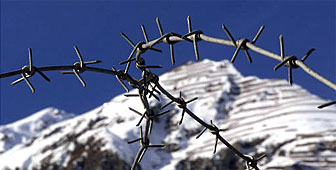Government dismisses criticism over “heavy-handed” security in Davos

The government has rejected criticism of the "heavy-handed" police action at the World Economic Forum (WEF) summit in Davos. The president, Moritz Leuenberger, said violent protests in Zurich proved that the security operation had been justified.
Leuenberger’s comments came after non-government organisations (NGOs) and the media protested on Sunday at what they called an attack on the right to free assembly.
They were complaining at the unprecedented police presence at the WEF summit, which prevented protests in the Swiss resort. One NGO, the Berne Declaration, said it would be taking legal action against the authorities for the “heavy-handed” police action.
Police and army units sealed off Davos at the weekend, averting any serious violence in the resort. At one point water cannon were used to drive back about 300 protesters who had managed to reach Davos and were heading for the congress centre where the WEF meeting is being held.
Anti-globalisation protesters instead resorted to violent protest in other Swiss cities, most notably Zurich, where they rampaged through the streets, setting fire to cars and damaging buildings. Tear gas and rubber bullets were used to disperse the crowd and around 100 arrests were made.
There were also clashes between police and demonstrators in Bern.
But both Leuenberger and the economics minister, Pascal Couchepin, said the violence in Zurich late on Sunday showed the unprecedented security operation in Davos had been justified.
“Some protesters said they didn’t want an open dialogue, but only to interrupt this meeting,” said Couchepin. “Freedom to meet is one of the fundamental rights of a democracy.”
A Swiss parliamentarian attending the World Social Forum added his voice to the criticism of police operations in Davos. Pierre-Yves Maillard, a Social Democrat member of parliament, said Switzerland’s reputation had suffered.
“Newspapers around the world have shown images portraying a Switzerland that is barricaded, closed and brutal.” Maillard told swissionfo he “was shocked and ashamed when participants asked what had happened” in Davos.
swissinfo

In compliance with the JTI standards
More: SWI swissinfo.ch certified by the Journalism Trust Initiative







You can find an overview of ongoing debates with our journalists here . Please join us!
If you want to start a conversation about a topic raised in this article or want to report factual errors, email us at english@swissinfo.ch.